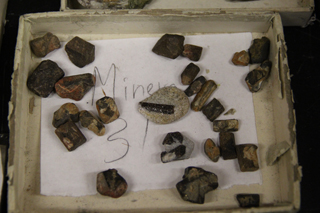In this section, Prof. Perron shares insights about co-teaching.
"The ability to observe instructors having a scientific repartee enhances the learning experience for undergraduate students."
Introduction to Geology has evolved over the years to become a more active experience for students and instructors. As co-teachers, we’ve reduced some of the traditional lecture time and have included more interactive hands-on activities. This is in recognition of the fact that so many things in earth science are tangible. During classes, we make a big effort to expose students to hand samples. We teach them how to identify rocks and minerals. We take them out into the field. In fact, the in-depth field trip we developed two years ago, which involves driving students to Upstate New York and back through western Massachusetts, has now become an integral part of the class.

A box of minerals to be identified by the students in the mineral identification lab. (Image by MIT OpenCourseWare.)
One of the best things about co-teaching 12.001 is our balance of interests and expertise. Oliver Jagoutz is what we in the business call a “hard rock” geologist and I’m what some people would call a “soft rock” geologist. Oliver studies the formation and evolution of the continental crust, while I study the earth’s surface and all the processes that shape that surface. Oliver tends to work over longer time scales and looks a bit deeper down into the earth than I do, while I think more about the interface between the solid earth and the atmosphere. Our different lenses provide students with a glimpse into the variety of specialties within the field of geology and allow us to divide the teaching of topics in the syllabus along lines of expertise. This is helpful because it enables us to provide students with more in-depth answers to their questions.
Importantly, co-teaching also allows us to have a repartee while working with students. Although we do not typically lecture together, we do play off of each other during field trips. We have spirited discussions about phenomena we’re observing. These discussions help students realize that not all of the details about how geologic stories unfold are entirely understood. The ability to observe instructors having a scientific repartee enhances the learning experience for undergraduate students.










